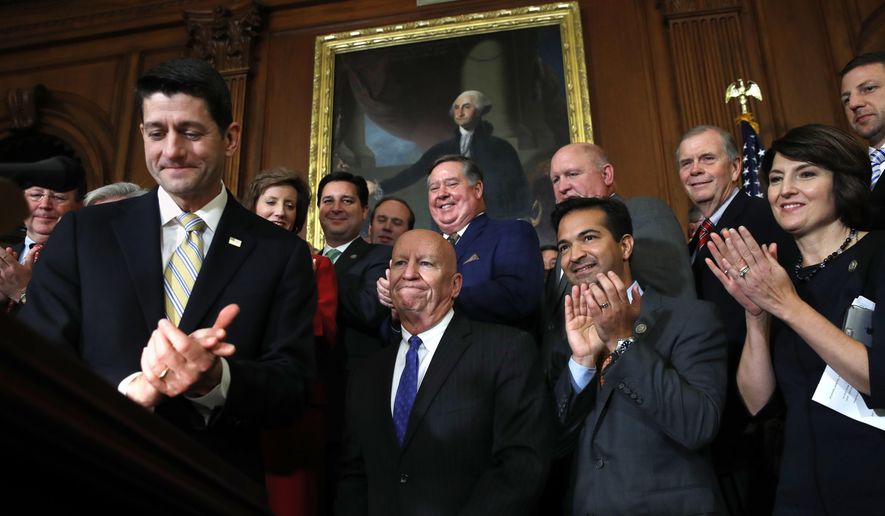With spines stiffened by a presidential pep talk, House Republicans easily approved a $1.4 trillion tax cut Thursday, taking the first big step toward a decades-overdue overhaul that Republicans hope will send the economy soaring and win back wavering voters.
Desperate for a legislative win, Republicans brushed aside Democrats’ warnings that the bill will be seen as a sop to the wealthy instead of the boost to the middle class that President Trump promised.
“America needs a comeback,” said House Majority Leader Kevin McCarthy, California Republican. “This is your comeback.”
The 227-205 vote marks the first major step, but Republicans still have a number of hills to climb. The Senate plans to pass its own version after Thanksgiving, and then the measures need to be squared with each other.
On Thursday, Republican senators advanced their own plan through the Senate Finance Committee after they voted down dozens of Democratic amendments, including provisions that would have denied the wealthiest a tax cut..
In the House, 13 Republicans voted against the bill — almost all of them from states with high local taxes who fear some of their constituents could lose under the plan, which eliminates deductions for state and local income taxes.
SEE ALSO: Senate Finance Committee advances Republican tax plan
No Democrats backed the bill.
“This is the most irresponsible bill I have been confronted with in 37 years,” said Rep. Steny H. Hoyer, a Maryland Democrat who said the massive deficits compiled by the proposed legislation — as much as $2 trillion, when interest costs and other extensions are included — amount to a betrayal of principles for which Republicans have long argued.
Broad tax cuts
Democrats said they could have supported a bill that cut taxes for those with middle incomes but rejected any relief for the wealthy.
The House bill doesn’t change the top tax rate of more than 39 percent, but it raises the thresholds so it kicks in only at a higher income — more than $1 million for a married couple filing jointly. The bill cuts the six other existing tax brackets down to three and raises most of the income thresholds so Americans would see tax breaks.
A near-doubling of the standard deduction would help most taxpayers, and raising the per-child tax credit would help families, Republicans said.
On the business side, the corporate income tax rate would be lowered from 35 percent to 20 percent, taking it from the highest among major industrialized economies down below the global average.
Small businesses that pay taxes as personal income would see cuts as well, though the actual rates depend on a complex set of calculations.
The bill also eliminates the estate tax, leaving what is estimated to be more than $170 billion in the hands of wealthy Americans.
Democrats said the middle class would end up suffering because of the loss of tax breaks for state and local tax deductions, medical deductions and student loan interest.
Republicans acknowledged instances in which taxpayers who might have been claiming a number of breaks to lower their tax bills would end up paying more, but said almost all families would save through lower rates and a higher standard deduction.
“What we are doing here is determining the kind of country we’re going to have,” said House Speaker Paul D. Ryan, Wisconsin Republican, casting the bill as a chance for the economy to escape the decadelong doldrums since the Great Recession.
Trump’s personal push
President Trump met behind closed doors with House Republicans just ahead of the vote, giving them a final pep talk.
“You have the chance to be the best Congress in history,” the president told them.
Of the $1.4 trillion in total tax cuts over the next decade, the House bill delivers more than 70 percent of that benefit to businesses in the form of the corporate and small-business cuts.
The Senate plan is more generous to individuals, with more than 40 percent going to them.
Following four days of hearings, the Senate Finance Committee advanced the Senate plan on Thursday, as lawmakers eye a possible floor vote the week after Thanksgiving.
Chairman Orrin G. Hatch said it’s a good bill that will be a boon for the middle class.
“Both Republicans and Democrats have long supported the key elements of this bill,” Mr. Hatch said.
Before the final vote, the committee approved a series of changes Mr. Hatch introduced Thursday evening, which included a provision that mirrored a House plan requiring certain money managers to hold investments for a longer period of time to take advantage of a lower capital gains rate.
Sen. Ron Wyden, the committee’s ranking Democrat, lamented the relatively late changes and said many Americans can expect to see tax hikes under the bill.
“What happened here bears no resemblance to the storied history of this committee,” Mr. Wyden said.
The Senate plan also makes use of a number of gimmicks to game the numbers, trying to stay within arcane budget rules that would allow the bill to pass without having to face a Democratic filibuster.
That also means preserving the balance struck in the current bill.
To that end, Republicans rejected a series of attempts by Democrats in committee Thursday to eliminate tax cuts for people earning more than $1 million per year or to block future cuts if the economy doesn’t hit certain benchmarks.
Mr. Hatch said the proposals amounted to poison pills and led the fight against them.
“As I view it, this bill is designed to provide tax cuts across the board, with a focus on the middle class,” he said.
Democrats scoffed and said part of the gimmickry is an expiration of the middle-class tax cuts in 2025, which could result in another fiscal cliff.
Mr. Wyden said it was all the more stunning because the corporate tax cuts are permanent in the Senate bill.
“We shouldn’t make tax relief for America’s hardworking families in effect held hostage to lock in this huge array of new tax breaks for multinationals,” he said.
Like the House bill, the Senate slashes the corporate rate from 35 percent to 20 percent.
But the Senate bill is more generous to individuals, keeping the current number of tax brackets but raising the income thresholds and lowering the rates for each.
The Senate bill also repeals Obamacare’s individual mandate.
Deductions disappear
Perhaps the biggest sticking point for Republicans, though, is the treatment of write-offs for state and local taxes. The House bill eliminates the deduction for state and local income taxes but allows up to $10,000 for a property tax deduction.
The Senate bill doesn’t allow any state and local deductions.
A dozen of the 13 Republicans who voted against the House bill were from high-tax states whose residents would be hardest-hit by the elimination of the deduction. Though most residents would still come out ahead, it’s not as good a deal for them as it is for those in low-tax states.
Rep. Thomas MacArthur, a New Jersey Republican who backed the House bill, said the property tax deduction will have to be in whatever final compromise comes back to the House.
“If we can blend the best parts of both bills, then we’ve got a winner,” he said.
• Stephen Dinan can be reached at sdinan@washingtontimes.com.
• David Sherfinski can be reached at dsherfinski@washingtontimes.com.




Please read our comment policy before commenting.